
Airbnb Case Study
Introduction:
Airbnb serves as a platform that connects individuals seeking accommodation with those looking to rent out their extra space. It enables users to explore a wide array of rental properties globally. Despite being the largest provider of accommodations worldwide, Airbnb doesn’t own any properties itself. This unique business model underscores its success. It offers unparalleled convenience for both renters and property owners, allowing renters to find suitable accommodations near their desired locations while enabling property owners to generate additional income by renting out their available space.
The remarkable success of Airbnb has propelled it to become one of the most valuable companies globally, boasting a staggering valuation of $70.39 billion as of November 11, 2022. Its continuous expansion and innovation have opened up a new market for individuals to monetize their spare space. Moreover, Airbnb stays relevant by introducing enticing programs and perks to attract more hosts to list their properties on its platform.
The Airbnb business case exemplifies how a company can thrive by identifying and addressing unmet needs in the market. Through its innovative approach, Airbnb has carved out a niche for itself, transforming into one of the world’s most valuable enterprises.
What is Airbnb & Its Brief History
Airbnb started in 2008 when three friends, Joe Gebbia, Brian Chesky, and Nate Blecharczky, faced financial struggles. They realized they could rent out space in their apartment for a design conference in San Francisco. They created a website called airbedandbreakfast.com and offered airbeds and breakfast to guests. This idea began with just three guests paying $80 per night.
Later, they expanded their idea to accommodate travelers attending conferences. They renamed the website Airbed and Conferences United States. However, they soon realized their idea could apply to anyone needing accommodation beyond conferences.
In 2009, they shifted their focus from airbeds and breakfast to just breakfast, selling themed cereal named Obama ‘O’s and Cap’n McCain during the 2008 US elections. They used the profits from the cereal to fund Airbnb.
They joined Y Combinator, a startup funding company, and changed their name to Airbnb in 2009. With an investment from Sequoia Capital, they grew rapidly, meeting hosts personally to build trust and a sense of community.
By 2014, Airbnb was recognized as the company of the year, having disrupted the travel industry and built a strong brand. They celebrated their one millionth listing in December 2014.
By 2016, Airbnb had tripled its listings and served over 150 million guests worldwide. From starting with just three airbeds in a living room, Airbnb is now present in over 191 countries and 65,000 cities, offering a unique travel experience to users worldwide.
Hosts
For hosts, getting started on Airbnb is straightforward. They need to create a profile and describe their listing or services, adding photos and setting a price. Airbnb even offers a free professional photography service, which has been shown to increase bookings.
Hosts also need to manage availability and house rules for their listing. When a guest books, hosts receive a confirmation message and can communicate with guests online or through the app to plan their arrival. Hosts can choose to confirm bookings manually within 24 hours if they prefer.
To give hosts peace of mind, Airbnb offers a $1 million guarantee for accidental damages and Host Protection Insurance to cover liabilities if guests are injured or cause property damage. There’s also a 24/7 Trust and Safety team available for support at no extra cost. These measures ensure hosts feel secure when renting out their spaces.
Guests
Guests, similar to hosts, must also provide relevant information. They must have a complete
profile with personal information and preferentially a profile photo. A complete description
facilitates the process between guests and hosts. The more information a host can retrieve, the
easier it will be to create a trust relationship with the guest.
To find the ideal experience, guests must select the location and the dates. If searching for
accommodation, guests must choose between renting an entire home, a private room or a shared
room. Guests also have the opportunity of selecting different filters to facilitate their research.

Airbnb in 2016
Beyond just offering cool places to stay, Airbnb is always working on making its business better. They’ve started focusing on another group of customers: business travellers. Plus, they’re coming up with new services to give their guests an awesome all-around travel experience.
Business Travel
With over two million listings in nearly 191 countries, Airbnb is known for its unique places to stay. But they’ve gone beyond that by offering a service for business travel. This lets companies book and handle accommodations for their employees.
To qualify for this business travel service, both hosts and places to stay are checked against certain standards. For instance, hosts need to have responded to 90% of booking requests within a day and have a five-star rating for cleanliness and accuracy. Places to stay must have amenities like self-check-in, smoke and carbon monoxide detectors, and internet access. Listings are regularly reviewed, and they might lose their business travel status if they don’t meet all the requirements.
According to Skift, as of July 2016, about 10% of all Airbnb bookings were for business travel.
Airbnb Experiences
Airbnb is making its accommodation service even better by introducing something new called Airbnb Experiences. Now, hosts can offer guests cool local activities along with a place to stay. These experiences could be workshops, tours, or other fun stuff organised by locals.
Hosts who offer these experiences have to pay a fee, but if it’s organised by a non-profit, Airbnb doesn’t charge anything, so all the money goes to the non-profit.
According to Brian Chesky, Airbnb’s CEO, they’ve started this in 12 cities and plan to expand to 50 cities by 2017.
Airbnb Places
Along with offering their places to stay, Airbnb hosts can suggest cool spots for their guests to check out using guidebooks. These guidebooks are like personal recommendations from the hosts, giving guests insider tips to enhance their stay. Guests can also find free audio-guided tours called Audio Walks in these guidebooks, thanks to a partnership with Detour.
By checking out these guidebooks, guests can skip the touristy places and explore hidden gems, making them feel like they’re living more like locals during their visit.
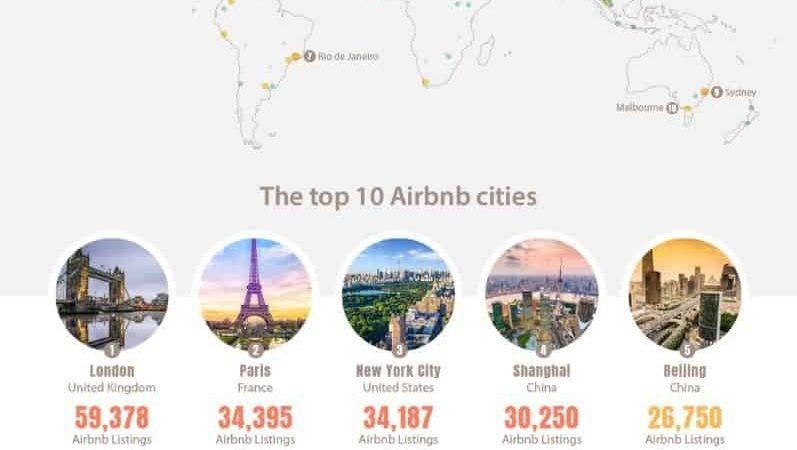
Airbnb business model
Airbnb works like an aggregator, which is a type of business model where the company gathers information about different providers offering a specific product or service. Then, Airbnb partners with these providers and sells their services under its own brand.
Since Airbnb acts as a brand, it needs to ensure that the services provided by its partners maintain consistent quality and pricing. This is achieved by entering into contracts with these partners. Think of it as a business model where you earn money by connecting customers with service providers, without needing to own any inventory yourself.
Unlike the traditional model where you needed to own property like hotels to start booking, Airbnb has changed the game by linking people who need space with those who have it. This has fueled its rapid growth.
Homeowners with extra space can list their rooms on the website to earn extra income. What sets Airbnb apart is that it sells not just space but an experience. Many travellers prefer this cozy, home-like feeling when exploring new places, and it’s often more budget-friendly than hotels.
Airbnb also offers personal profiles and a review system, helping travellers choose hosts and accommodations wisely. This builds trust within the community.
Apart from travellers and hosts, Airbnb also involves a network of freelance photographers worldwide. They take high-quality photos of properties, which increase visibility and attract more guests. Airbnb directly pays these photographers for their services.

Airbnb Distribution Strategy
Airbnb has revolutionised how people find accommodation online, becoming the world’s largest experience host. They keep costs low by doing most of the work in-house, helping hosts build their brand so guests can easily find them again. Let’s see how their distribution strategy has evolved:
– In 2008, they started with Bed and Breakfast services in the US, later becoming Airbnb.
– By 2011, they expanded globally, opening offices in London and Hamburg to reach more hosts.
– They continued expanding, with offices in Paris, Milan, Barcelona, Moscow, Sao Paulo, and Copenhagen by 2012.
– In Australia, they saw rapid growth potential, opening an office in Sydney.
– Partnering with home-cleansing services in 2014 boosted listings and ensured well-maintained homes.
– In 2015, they introduced the “Business Travel Ready” badge, attracting big companies.
– In 2018, Airbnb Plus offered verified homes with added amenities, catering to luxury travellers.
– Partnering with SiteMinder allowed listing hotels and accommodations.
– Lower commissions for boutique hotels strengthened their distribution channel.
– They have many software partners to enhance user experience and are available in 62 languages.
– Acquisitions helped expand their network and improve listing quality.
– Now, they list various accommodations, from homes to boutique hotels, totaling over 5.6 million listings and serving over 800 million guests worldwide by 2020.
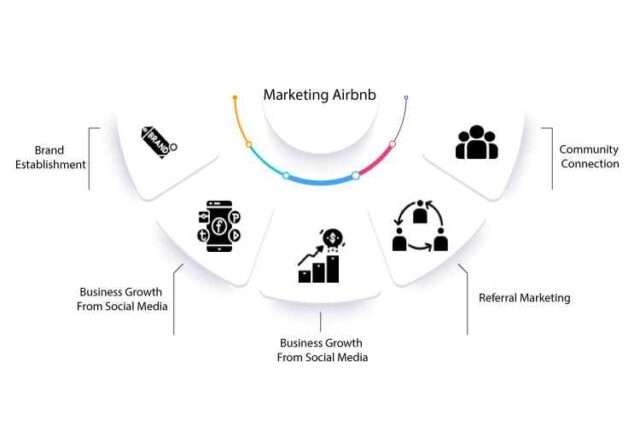
Marketing Strategy of Airbnb
Social Media Marketing
Airbnb is present on popular social media platforms like Instagram, Facebook, and Twitter. By August 2023, their Facebook page had gathered an impressive 16 million likes. On Instagram, they have 5.4 million followers, while their YouTube channel has 636k subscribers. Additionally, Airbnb has amassed a following of 880.5k on Twitter.
Let’s now analyse how their posts are:
- Airbnb uses its social media platforms to tell stories and inspire its audience. They share travellers’ experiences, along with photos, tips, and recommendations for trip planning and finding accommodations. By leveraging user-generated content and posts from customers, Airbnb effectively connects with and engages its target audience through its marketing efforts.
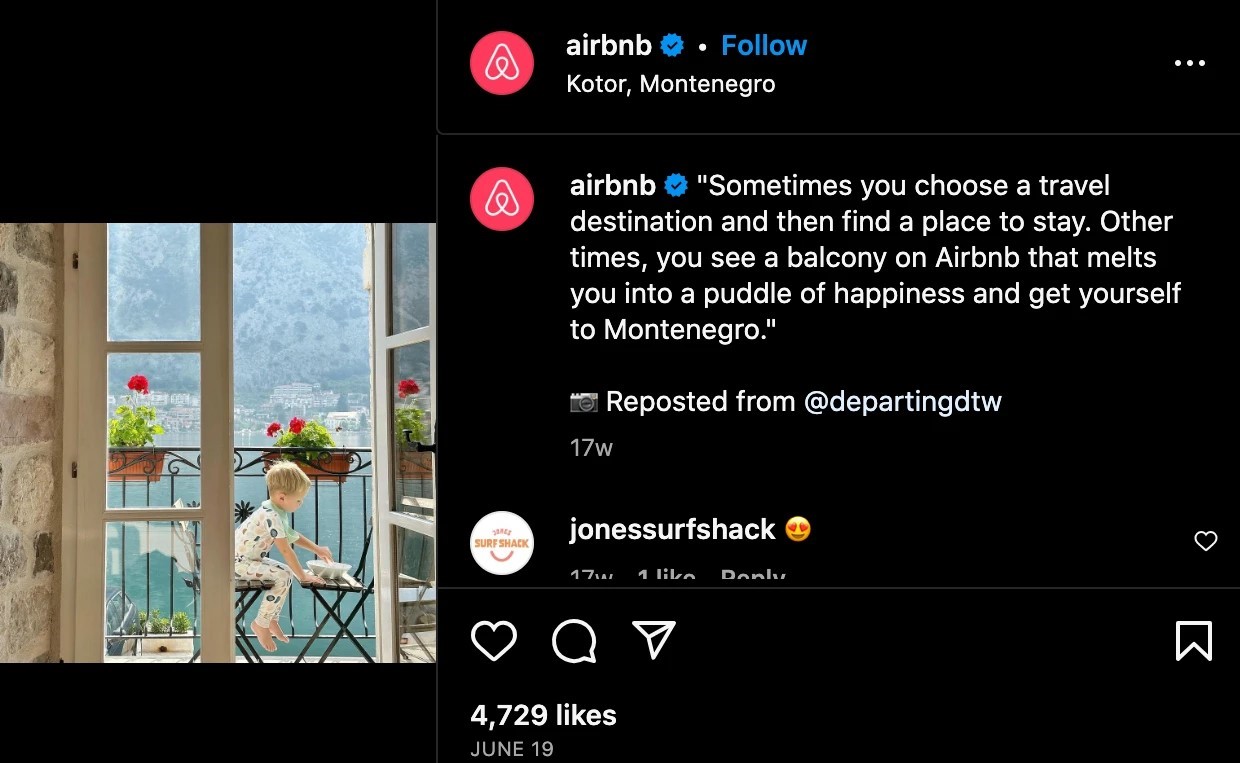
- Airbnb raises awareness about social issues and seeks support through its non-profit branch, Airbnb.org.
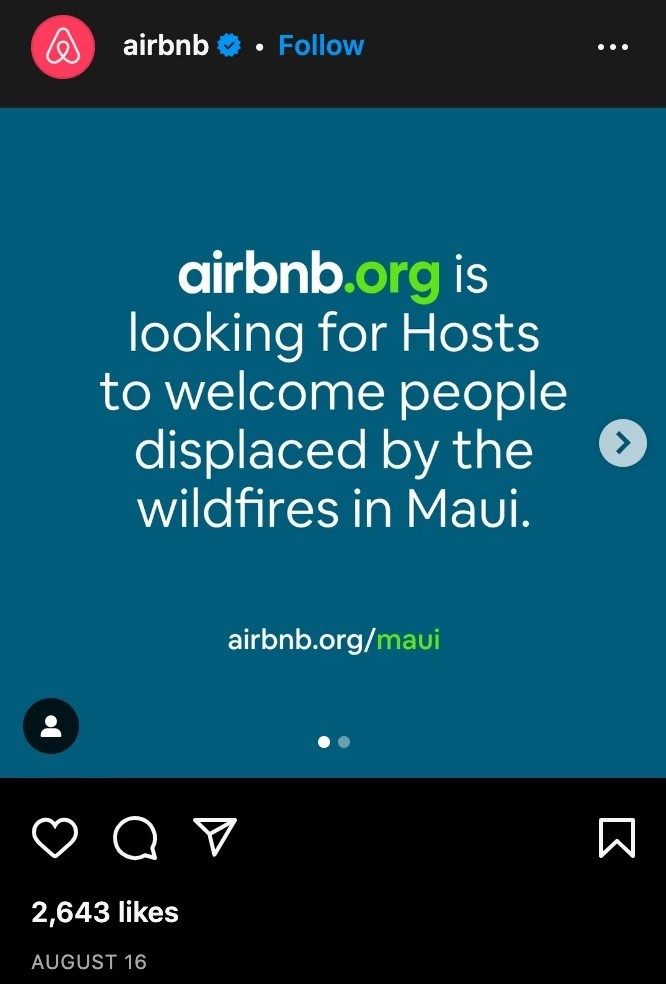
- Airbnb has teamed up with MotoGP champion Marc Marquez to offer fans a unique opportunity to spend a night in his squad’s motorhome during the Catalan Grand Prix. To spread the word about this exciting experience, Airbnb is using storytelling and sharing behind-the-scenes content. They’re posting photos and videos of the motorhome and the race track, giving potential guests a sneak peek of what they can enjoy if they decide to book this special experience.

Experiential marketing X Brand collaboration
Experiential marketing gets customers involved with a brand by giving them memorable and emotionally engaging experiences.
They really amp it up with their partnerships with movies and shows. Remember the Barbie house they made to promote the movie? And the house of Monica, the main character from Brazil’s ‘Monica and Friends’?

Before the release of the “Barbie” film by filmmaker Greta Gerwig, Airbnb offered tourists a chance to stay at Barbie’s Malibu DreamHouse. They promoted it through Instagram and interactive social media content, asking people about their experiences. The tickets were free, and Airbnb got a lot of attention from this campaign.
This collaboration benefits both brands by promoting them to a wider audience.
Content Marketing Strategy of Airbnb
Airbnb’s website demonstrates effective content marketing for a service-based business.
Rather than simply selling their services, they highlight and sell the unique experiences customers have had with Airbnb. They do this through blogs and video content, showcasing the diverse and memorable experiences available through their platform.
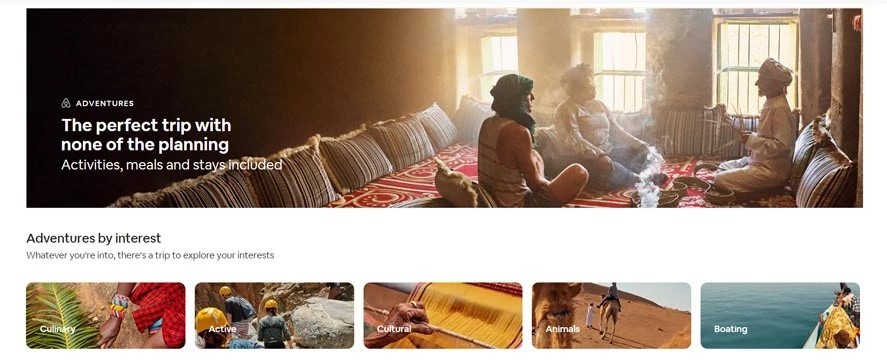
Airbnb India
Airbnb has high hopes for the Indian market, with its co-founder stating that Millennials will be the main drivers of growth in the country. They’re active in many tourist hotspots like Goa, Delhi, Mumbai, and Rishikesh. Recently, they even invested around $200 million in Oyo Rooms. More than one million Indians have travelled using Airbnb globally.
In India, Airbnb has over 30,000 listings, which is a 115% increase from the previous year. The number of nights booked on Airbnb in India has nearly doubled since 2016. Additionally, there has been over 100% year-on-year growth in inbound guests from around the world between 2017 and 2018.
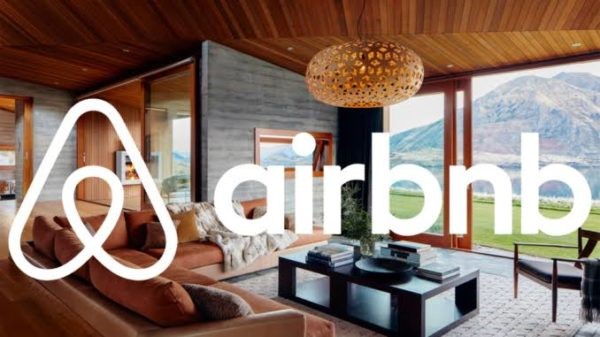
Airbnb statistics
Airbnb has 31 offices worldwide and has hosted around 400 million guests since its inception. With over 150 million users and more than 5 million listings globally, it’s a popular choice for travellers, especially millennials who make up about 60% of all guests.
The platform offers million-dollar insurance coverage for hosts and has 1.9 million listings available at any given time. With 1000-5000 employees, Airbnb is constantly improving its product through acquisitions and has raised about $4.4 billion in funding.
Despite spending $23.5 million on advertising in the U.S., the cost of renting an average home on Airbnb is often cheaper than a single hotel room. Moreover, the company has reported profits of around $93 million in both 2017 and 2018, showing its financial success.
How Airbnb Works?
Airbnb serves as a bridge between travellers and local hosts. By offering a spare room in your home on Airbnb, you can generate income through bookings. This arrangement benefits both travellers, who can enjoy affordable lodging with a homely touch, and hosts, who earn income by providing accommodation.
Additionally, hosts have the option to offer extra services such as breakfast, guided tours, or a pet-friendly environment, with the freedom to set their own rates for these offerings.
The platform’s rating and review system fosters trust between hosts and travellers, often resulting in long-term connections between them based on positive experiences.
Airbnb vs Uber vs Oyo Rooms
Airbnb, Uber, and Oyo Rooms all operate on the aggregator model, but each has distinct approaches and focuses. Oyo Rooms has notably transitioned to managing entire buildings independently and has expanded into co-living and co-working spaces.
Uber simplifies travel by acting as a mediator between drivers and riders, ensuring a consistent level of service. However, unlike Airbnb, where travellers choose accommodations based on discoverability and reviews, Uber assigns drivers without user choice and offers less detailed reviews.
While Uber suspends users with low ratings, it mainly compensates drivers through fixed commissions per ride. Oyo Rooms emphasises quality control and standardisation, with bookings made under the brand rather than individual hotels. Recently, Oyo has taken over full property leases, allowing day-to-day operations under its brand.
Unlike Oyo, Airbnb lacks direct control over the quality of accommodations and primarily earns through commissions.
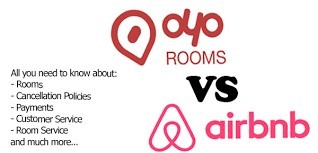
Conclusion
Airbnb has emerged as a standout success story in the past decade, revolutionising the way people travel and disrupting the hotel industry. Its unique platform allows individuals to rent out their homes, offering travellers a more affordable and personalised lodging experience. Leveraging technology, Airbnb has rapidly expanded its reach and attracted a large user base through innovative marketing strategies.
The company’s future appears promising, especially with its recent foray into the business travel segment, positioning itself as a key player in online travel booking. Airbnb’s disruptive business model and technological advancements have already reshaped the traditional hotel landscape, and this trend is expected to continue.
While Airbnb faces challenges from the conventional hotel sector as it expands into new markets, its ability to innovate and curate distinctive guest experiences will likely sustain its influence in the travel industry for years to come.







